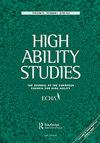教师对资优学生领导才能信念的比较研究
IF 1.8
4区 教育学
Q2 EDUCATION, SPECIAL
引用次数: 0
摘要
摘要尽管社会文化背景可能具有相关性,但很少有研究考察文化价值观对教师对天才学生领导力发展的影响。本研究选择了三个代表集体主义和个人主义背景的国家,并比较了来自这些国家的478名教师(韩国=176,36.8%,澳大利亚=169,35.4%,美国=133,27.8%)对天才学生领导才能的普遍性和发展的信念差异。个人主义(澳大利亚和美国)和集体主义(韩国)在学生具有领导潜力的信念方面存在差异;他们对有效领导风格和领导者素质的判断;他们对天才学生作为未来领导者的资格的看法;以及他们推荐学生参加领导力教育项目的首选标准。尽管无法确定因果关系,但这项研究谨慎地表明,领导力和领导者与文化中介的价值观和实践交织在一起。未来的研究应该在跨文化比较背景下继续研究这些差异。本文章由计算机程序翻译,如有差异,请以英文原文为准。
A comparative study of teachers’ beliefs about gifted students’ leadership talent
ABSTRACT Despite the likely relevance of socio-cultural context, very few studies have examined the influence of cultural values on teachers’ perceptions of gifted students’ leadership development. This study chose three nations representing collectivistic to individualistic contexts and compared how 478 teachers from these countries (South Korea = 176, 36.8%, Australia = 169, 35.4%, U.S. = 133, 27.8%) differed in their beliefs about the prevalence and development of gifted students’ leadership talent. Differences were found between the individualistic (Australia and the U.S.) and collectivistic (South Korea) settings in their beliefs regarding which students have leadership potential; their judgments about effective leadership styles and leader qualities; their perceptions of gifted students’ qualifications as future leaders; and their preferred criteria for recommending students for a leadership education program. Although unable to identify causal relationships, this study nevertheless cautiously suggests that leadership and leaders are intertwined with culturally mediated values and practices. Future studies should continue examining these differences in cross-cultural comparative contexts.
求助全文
通过发布文献求助,成功后即可免费获取论文全文。
去求助
来源期刊

High Ability Studies
Multiple-
CiteScore
4.80
自引率
11.10%
发文量
7
期刊介绍:
High Ability Studies provides a forum for scholars in a variety of disciplines associated with the development of human abilities to their highest level. It is a medium for the promotion of high ability, whether through the communication of scientific research, theory, or the exchange of practical experience and ideas. The contents of this journal are unique in reflecting concerns and recent developments in this area from childhood and across the whole life span in a variety of contexts. Far from being restricted to the traditional focus on high-level cognitive development, it also presents investigations into all other areas of human endeavour, including sport, technology, the arts, business, management and social relations.
 求助内容:
求助内容: 应助结果提醒方式:
应助结果提醒方式:


